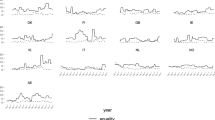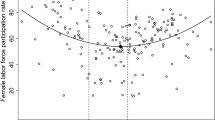Abstract
The year 2010 constituted a favourable opportunity for the greater descriptive representation of women in the UK Parliament. The parties were publicly competing over the issue; Parliament had its own Committee looking at it; and there were plenty of vacancies for candidates in each of the parties’ held seats, as many more MPs than usual stood down. The outcome was disappointing. There was an overall increase in the number of women MPs – up from 128 to 142 – but this was only a 2.5 per cent increase on 2005. Inter-party differences remain. The Liberal Democrats witnessed a decline in the number and percentage of their women MPs and candidates; the Tories saw a doubling of their number, with women now constituting 16 per cent of their parliamentary party; and Labour has both the largest number and percentage of women MPs. These patterns are best explained by the parties’ different attitudes towards equality guarantees – measures that, all other things being equal, return women MPs to Parliament. In other words, Labour's All Women Shortlists once again delivered. The other parties’ efforts were simply less efficient at translating women candidates into MPs. Looking to the future, the picture is far from rosy. The Coalition's plans for political reform will likely increase competition for selection at the next general election to women's detriment, and the impact of the Independent Parliamentary Standards Authority raises the possibility that their supply might decrease too.

Similar content being viewed by others
Notes
This excludes Anne McIntosh, whose election was delayed by the death of one of the other candidates during the election campaign – she was elected some three weeks later.
http://www.ipu.org/wmn-e/classif.htm, accessed 27 June 2010.
Note this excludes Andrew Pelling MP, Croydon Central, who re-stood but as an Independent rather than Conservative, but includes Clare Short and Bob Waring in the Labour figures and Quentin Davies, Derek Conway and Bob Spink in the Conservative figures.
Daily Mail, 4 August 2009.
See, for example Lib Dem News, 20 June 2008.
It might also be considered an example of equality rhetoric, signalling to aspirant candidates and the grassroots that women's representation was being taken seriously.
Liberal Democrats – Reports to Conference (spring 2010), available at http://www.libdems.org.uk/siteFiles/resources/PDF/conference/Birmingham%20reports%202010%20PLAIN%20TEXT.txt.
Shortlisting quotas have been party policy since the inception of the SDP (Coote and Patullo, 1990).
See, for instance, Nick Clegg's evidence to the Speaker's Conference.
Julia Goldsworthy: ‘I have changed my mind on all women shortlists … the Lib Dems now have fewer women MPs … that's not acceptable’ (Cornish Guardian, 7 June 2010).
This section draws extensively on Childs and Webb (2011).
If party activists did not want to lose this power they could voluntarily adopt an AWS.
See Kenney (2009) for a discussion of ‘localness’ and Labour candidates in Scotland.
Snowdon (2010) argues that Steve Hilton, Cameron's Director of Strategy, advised him to hold out.
Subsequent research will need to be undertaken to establish this.
The Totnes primary cost some £40 000 (Guardian, 4 August 2009).
See Labour Women's Network, http://www.labour.org.uk/women/labour_women.
The Guardian, 5 April 2010.
Speaker's Conference (2010, p. 16).
Internal Labour party document.
Tribune, 15 November 2009.
In selections for the 2005 general election and those that took place before January 2010 the CLPs with retiring MPs could ‘volunteer’ as AWS; if too few volunteered before the set deadline the NEC designated AWS seats.
This was suspected in Airdrie and Ashfield. http://petergkenyon.typepad.com/peterkenyon/2010/02/has-labour-scrapped-all-women-shortlists-in-wales.html.
Here, a seat is classified as a retirement seat if the 2005 notional results for the new seat put the incumbent, but retiring, MP, in the winning place. This is in line with what Labour meant by a retirement seat and is hence a better test of AWS because it excludes seats that Labour would not have won in 2005.
For example, Pontypridd (11, 428 majority); Islwyn (16, 787 majority); and Erdington (10 000+ majority), were all designated as open seats.
Harriet Harman could not get agreement to include BME shortlists in the Equality Bill; Labour's response to the Speaker's Conference recommendation for permissive BME shortlist legislation noted that, ‘whilst we think more needs to be done, there is no consensus amongst our BAME activists, nor the wider BAME community, that all-BAME shortlists are the best way to address this underrepresentation’ (Speaker's Conference, 2010, Appendix 4, 20). Note, the Labour party uses the term BAME in preference to BME.
In 2010 there were 11 seats where a woman was guaranteed to be returned as all candidates for the three main parties were female (Hornchurch and Upminster; Mitcham and Morden; Brighton Pavillion; Lewisham Deptford; Epping Forest; Bolton West; Glasgow North; Islington Sth; Solihul; Truro and Falmouth; Cardiff Central); for men this was true in 267 seats.
Cf. Sunday Times (26 July 2009) which reports that the ‘team promoting female candidates’ are focused on the selection of more women as replacements for expenses scandal retirees.
Coalition Agreement (2010, p. 27) http://www.cabinetoffice.gov.uk/media/409088/pfg_coalition.pdf, accessed 20 May 2010.
The IPSA was created by the Parliamentary Standards Act (PSA) in 2009. See http://www.ipsa-home.org.uk/faqs.html.
Hansard Society, http://mpexpensesconsultation.org.uk/responses/.
Guardian, 19 February 2010.
Women's Parliamentary Labour Party, http://mpexpensesconsultation.org.uk/responses/.
Note this position is also taken by the WPLP (IOS, 8 November 2009).
See http://www.ipsa-home.org.uk/EqualiytandImpact.html; Unlock Democracy, http://mpexpensesconsultation.org.uk/responses/.
Women's Parliamentary Labour Party, http://mpexpensesconsultation.org.uk/responses/.
Consultation on Amendments to the MPs’ Expenses Scheme Rules, June 2010, http://www.ipsa-home.org.uk/Publications.html#.
References
Ashe, J. (2009) Winners and losers in British Labour Party selections, 2001–2008. Paper presented to the ECPR Standing Group on Gender and Politics, Queen's University, Belfast.
Baldez, L. (2007) Primaries vs. quotas: Gender and candidate nominations in Mexico, 2003. Latin American Politics and Society 49 (3): 69–96.
Bale, T. (2010) The Conservative Party from Thatcher to Cameron. Cambridge, MA: Polity.
Campbell, R. and Childs, S. (2010) Wags, wives and mothers. Parliamentary Affairs 63 (4): 760–777.
Campbell, R., Childs, S. and Lovenduski, J. (2006) Equality guarantees and the conservative party. Political Quarterly 7 (1): 18–26.
Childs, S. (2010) Engendering intra party democracy: Lessons from the United Kingdom. Paper prepared for IPD Workshop; 30–31 August, Carleton University, Ottawa.
Childs, S. (2008) Women and British Party Politics. London: Routledge.
Childs, S., Lovenduski, J. and Campbell, R. (2005) Women at the Top. London: Hansard Society.
Childs, S. and Webb, P. (2011) Gender and the Conservative Party: From Iron Ladies to Kitten Heels. Basingstoke, UK: Palgrave.
Conservative Party. (2010) The Conservative Party Manifesto 2010. London: Conservative Party.
Coote, A and Patullo, P. (1990) Power and Prejudice: Women and Politics. London: Weidenfeld and Nicolson.
Cowley, P. and Childs, S. (2010) The politics of local presence: Is there a case for descriptive representation? Published online 10 June 2010, http://onlinelibrary.wiley.com/doi/10.1111/j.1467-9248.2010.00846.x/pdf.
Evans, E. (2008) Supply or demand? Women candidates and the liberal democrats. British Journal of Politics and International Relations 10 (4): 590–606.
Evans, E. (2011) Gender and the Liberal Democrats: Representing Women? Manchester, UK: Manchester University Press.
Goldsworthy, J. (2010) There are Not Enough Female Politicians' Warns Former MP Julia Goldsworthy, http://www.thisiscornwall.co.uk/news/female-politicians/article-2270996-detail/article.html, accessed 8 July 2010.
Goodman, P. (2009) The death of the citizen MP and why I'am quitting politics. Daily Mail, 4 August.
Harrison, L. (2009) Selecting women candidates. Journal of Liberal History 62: 36–45.
House of Commons. (2010) Speaker's conference. (On Parliamentary Representation) London: Stationery Office.
House of Commons Library. (2008, November 18) Ethnic Minorities in Politics, Government and Public Life. London.
Kenney, M. (2009) Gendering institutions: The political recruitment of women in post-devolution Scotland. Unpublished PhD, University of Edinburgh.
Kittilson, M.C. (2006) Challenging Parties, Changing Parliaments. Columbus, OH: Ohio State University Press.
Krook, M.L. (2009) Beyond supply and demand. Political Research Quarterly, published online 17 June 2009, http://prq.sagepub.com/content/early/2009/06/17/1065912909336275.abstract.
Krook, M.L., Lovenduski, J. and Squires, J. (2009) Gender quotas and models of political citizenship. British Journal of Political Science 39: 781–803.
Lib Dem News (2008) Encourage more female candidates, urges Clegg. Editorial, 20 June.
Lovenduski, J. (2005) Feminizing Politics. Cambridge, MA: Polity.
McClaughlin, C. (2009) Party chiefs to take charge of remaining selections. Tribune, 19 November.
Norris, P. and Lovenduski, J. (1995) Political Recruitment. Cambridge, UK: Cambridge University Press.
Norton, P. (2000) The Report of the Commission to Strengthen Parliament. London: Conservative Party.
Oakshott, I. and Oliver, J. (2009) Young, gifted and tory. Sunday Times, 26 July.
Rule, W. and Zimmerman, J. (1994) Electoral Systems in Comparative Perspective: Their Impact on Women and Minorities. Connecticut: Greenwood Press.
Russell, A. and Fieldhouse, E. (2005) Neither Left nor Right? The Liberal Democrats and the Electorate. Manchester: Manchester University Press.
Snowdon, P. (2010) Back from the Brink. London: Harper Press.
Sparrow, A. (2009) Tories hail high turnout in ‘open primary’ to select candidate. The Guardian, 4 August.
Stratton, A. (2010) Labour's election line-up too male dominated, Harriet Harman says. The Guardian, 5 April.
The Guardian (2010) ‘Political reform: Votes for Women’, 19 February.
Author information
Authors and Affiliations
Corresponding author
Rights and permissions
About this article
Cite this article
Ashe, J., Campbell, R., Childs, S. et al. ‘Stand by your man’: Women's political recruitment at the 2010 UK general election. Br Polit 5, 455–480 (2010). https://doi.org/10.1057/bp.2010.17
Published:
Issue Date:
DOI: https://doi.org/10.1057/bp.2010.17




